

Exercices de maths. Parent Toolkit. Apps and Websites for Improving Parent-Teacher Communication. 6 Tech Tools That Boost Teacher-Parent Communication. Effective communication between educators and parents is important -- if not crucial -- for helping students learn.
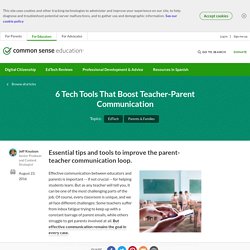
But as any teacher will tell you, it can be one of the most challenging parts of the job. Of course, every classroom is unique, and we all face different challenges: Some teachers suffer from inbox fatigue trying to keep up with a constant barrage of parent emails, while others struggle to get parents involved at all. But effective communication remains the goal in every case. In my teaching, I always found that it paid to be proactive; any time I could streamline the parent-teacher-student communication chain, I spent less time responding to parent phone calls and emails, and students tended to perform better. Sure, it can be a bit more work up front, but when everyone's on board: Parents wonder less about what's going on at school.
The most important thing is simply to keep everyone on the same page -- parents, students, and teachers. 1. 2. 3. 4. 5. 6. Resource. Tools for Parents - Tools of the Mind. Parents of Children in Tools What will my child’s experience in a Tools PreK or K be like?
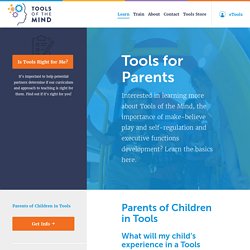
Wonderful! Your child’s teachers will individualize instruction, meeting each child where he or she is in development each day. Your child will be engaged in rich make-believe play with peers, have the opportunity for free play, and engage in small group and partnered literacy, math and science learning activities throughout the day. Tools teachers manage transitions, and set up a classroom environment and schedule to support children’s self-regulation and executive functions development.
In kindergarten, dramatizing the interactions and events in chapter books is the evolution of make-believe play. What are executive functions and self-regulation and why do they matter? Executive functions and self-regulation are underlying mental processes that allow us to plan, intentionally focus, sustain or shift attention as needed, remember on purpose, and manage how much energy we put into a task. Props. Five Tools to Improve Collaboration with Your Child’s Teachers and School – International Dyslexia Association.
Share This: September 2016 “There is no greater agony than bearing an untold story inside you.”
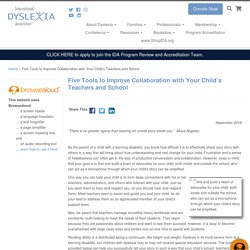
-Maya Angelou As the parent of a child with a learning disability, you know how difficult it is to effectively share your story with others in a way that will bring about true understanding and real change for your child. Frustration and a sense of helplessness can often get in the way of productive conversation and collaboration. …find and build a team of advocates for your child, both inside and outside the school, who can act as a microphone through which your child’s story can be amplified. One way you can help your child is to form deep connections with his or her teachers, administrators, and others who interact with your child. Also, be aware that teachers manage incredibly heavy workloads and are constantly multi-tasking to meet the needs of their students. Reading ability is a distributed along a continuum, like height and weight.
Tools for Student Success: Selected Publications for Parents and Teachers. The U.S.
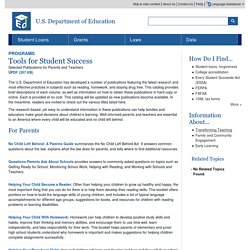
Department of Education has developed a number of publications featuring the latest research and most effective practices in subjects such as reading, homework, and staying drug free. This catalog provides brief descriptions of each volume, as well as information on how to obtain these publications in hard copy or online. Each is provided at no cost. This catalog will be updated as new publications become available. In the meantime, readers are invited to check out the various titles listed here. The research-based, yet easy-to-understand information in these publications can help families and educators make good decisions about children's learning. For Parents No Child Left Behind: A Parents Guide summarizes the No Child Left Behind Act. Questions Parents Ask About Schools provides answers to commonly asked questions on topics such as Getting Ready for School, Monitoring School Work, Helping with Reading, and Working with Schools and Teachers.
Available only online. From Teacher to Parent: Positive Discipline Tools That Work. We hear it all the time: A major stressor for teachers and parents is how to handle discipline both at home and in the classroom.
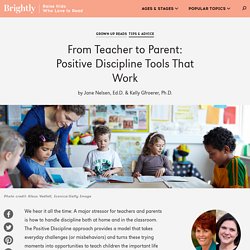
The Positive Discipline approach provides a model that takes everyday challenges (or misbehaviors) and turns these trying moments into opportunities to teach children the important life skills they’ll need to be successful in the long-term. This approach makes discipline encouraging and helpful instead of discouraging and stressful. Teachers from around the world have shared with us how Positive Discipline Tools have saved them time and stress. We’re delighted to share some of the Positive Discipline Tools that these wise educators have found most helpful, in the hopes you might find them useful as well.
First, it is important to avoid reward and punishment systems as a response to a child’s behavior. Resentment: “This is unfair. Another favorite Positive Discipline tool is “Asking Curiosity Questions.”